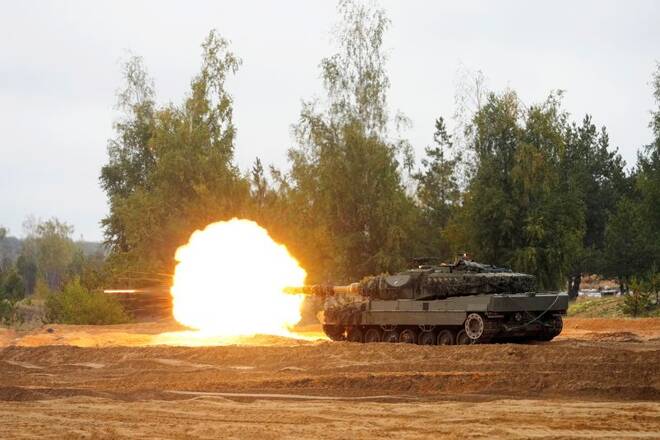Advertisement
Advertisement
Russia unleashes missiles, drones at Ukraine after Kyiv secures tanks, 11 dead
By:
By Nandita Bose, Andreas Rinke and Tom Balmforth
By Tom Balmforth and Ivan Lyubysh-Kirdey
KYIV (Reuters) – Ukrainian civilians raced for cover on Thursday as Russia fired a barrage of missiles and drones across the country, killing at least 11 people, according to officials, a day after Kyiv won Western pledges of battlefield tanks to combat Moscow’s invasion.
The German and American announcements they would send dozens of tanks infuriated Russia, which in the past has responded to apparent Ukrainian successes with massed air strikes that left millions without light, heat or water.
The Kremlin said it saw the promised delivery of Western tanks as evidence of growing “direct involvement” of the United States and Europe in the 11-month-old war, something both deny.
Ukraine said it had shot down all 24 drones sent overnight by Russia, including 15 around the capital, and 47 of 55 Russian missiles – some fired from Tu-95 strategic bombers in the Russian Arctic.
“Another attempt by a terrorist country to intimidate us with a massive missile strike has recently suffered a defeat, just as the whole of Russia will soon be defeated,” Ukraine’s President Volodymyr Zelenskiy said in a statement on Telegram.
Eleven people were killed and 11 wounded in the drone and missile strikes, which spanned 11 regions and also damaged 35 buildings, a State Emergency Service spokesperson said.
Air raid alarms had sounded across Ukraine as people headed to work. In the capital, crowds took cover for a time in underground metro stations.
“I’m left without anything … Not a single room is left intact, everything got hit,” said Halyna Panosyan, 67, surveying twisted sheets of corrugated metal, crumpled masonry and a large missile crater outside her ruined house in Hlevakha near Kyiv.
“At first, I heard a roar. And then there was an extremely loud strike that made me jump up. I was in the bedroom … I was saved by the fact that the bedroom is to the other side of the house.”
Strikes on energy facilities
A 70-year-old woman who gave her name only as Valentyna said she managed to survive by scrambling out of her damaged house over glass splinters. “Everything was in rubble,” she said.
Prime Minister Denys Shmyhal said electricity substations had been hit as Russia continued to target energy facilities.
DTEK, Ukraine’s largest private energy producer, said it was conducting pre-emptive emergency shutdowns in Kyiv, the surrounding region and the regions of Odesa and Dnipropetrovsk.
In Odesa, the Black Sea port designated a “World Heritage in Danger” site on Wednesday by the U.N. cultural agency UNESCO, Russian missiles damaged energy facilities, authorities said, just as French Foreign Minister Catherine Colonna was arriving.
“What we saw today, new strikes on civilian Ukrainian infrastructure is not waging war, it’s waging war crimes,” she said.
Colonna was due to meet her Ukrainian counterpart, Dmytro Kuleba, to discuss humanitarian and military aid and potentially whether France might join its NATO allies in supplying Ukraine with battle tanks, in this case its own Leclerc model.
Both Moscow and Kyiv, which have so far relied on Soviet-era T-72 tanks, are expected to mount new ground offensives in spring.
‘KEY IS SPEED’
Ukraine has been asking for hundreds of modern tanks in the hope of using them to break Russian defensive lines and recapture occupied territory in the south and east.
“The key now is speed and volumes…(of) numbers in tank support,” Zelenskiy said in a video address on Wednesday.
The United States was wary of deploying its hard-to-maintain M1 Abrams tanks, but ultimately promised 31 to persuade Germany to pledge its more easily operated German-built Leopards.
Germany will initially send 14 tanks and approve shipments by allied European states, with the ultimate aim of equipping two battalions – in the region of 100 tanks.
It said its Leopards should be operational in three to four months, and Britain said on Thursday it expected the 14 Challenger tanks it is sending to be in Ukraine in two months.
Keeping up the momentum, Canada later said it would send Ukraine four of its Leopard 2 tanks and armed forces members to train Ukrainian soldiers to operate the equipment.
Two diplomatic sources said France and Italy were close to finalising the technical details to supply an SAMP/T air defence system to Ukraine, although it was unclear how quickly a final decision would come.
On the diplomatic front, the United States on Thursday formally designated Russian private military company the Wagner Group as a transnational criminal organization, freezing its U.S. assets for helping Russia’s military in the Ukraine war.
Since invading Ukraine on Feb. 24 last year, Russia has shifted its emphasis from “denazifying” and “demilitarising” its neighbour to confronting what is says is an aggressive and expansionist U.S.-led NATO alliance.
Russia’s invasion has killed thousands of civilians, uprooted millions and reduced cities to rubble, while spurring Sweden and Russia’s neighbour Finland to apply to join NATO.
(Reporting by Reuters bureaus; writing by Cynthia Osterman, Himani Sarkar Kevin Liffey and William Maclean; editing by Grant McCool, Robert Birsel, Timothy Heritage, Tomasz Janowski and Andrew Heavens)
About the Author
Reuterscontributor
Reuters, the news and media division of Thomson Reuters, is the world’s largest international multimedia news provider reaching more than one billion people every day. Reuters provides trusted business, financial, national, and international news to professionals via Thomson Reuters desktops, the world's media organizations, and directly to consumers at Reuters.com and via Reuters TV. Learn more about Thomson Reuters products:
Latest news and analysis
Advertisement
